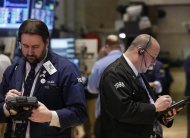 View PhotoTraders work on the floor at the New York Stock Exchange, March 28, 2013. REUTERS/Brendan McDermid
View PhotoTraders work on the floor at the New York Stock Exchange, March 28, 2013. REUTERS/Brendan McDermid
By Ryan Vlastelica
NEW YORK (Reuters) - After flirting with an all-time
high for three weeks, the S&P 500 (.SPX) posted its best closing
level in history. But some strategists say Thursday's record could be a
harbinger that the stock market rally is running out of steam.The S&P traded within 10 points of the all-time closing high for 13 sessions before breaking through, showing that investors need new catalysts to push firmly above resistance levels.
"As the market has gone higher ... upward moves have generally gotten smaller, which suggests that the move is getting old and that we need a pullback," said Mark Arbeter, chief technical strategist for Standard & Poor's in New York.
Stocks could fall about 3 percent to 4 percent, he said.
The benchmark index has risen almost 10 percent so far this year, fueled by strong profit growth and accommodative monetary policy from the Federal Reserve. But those gains have slowed as investors fret over Cyprus's bailout and mixed signs about the economy.
Still, stocks have been resilient, lifting the S&P to its record close of 1,569.19 on Thursday. Investors stepped in on declines to buy and finally pushed the S&P above the previous record set on October 9, 2007.
The broad index is also within a stone's throw of its intraday record of 1,576.09. The Dow surpassed its record close on March 5 and set a series of records, ending Thursday at 14,578.54.
The S&P has risen for 11 of the past 13 weeks, up 0.4 percent over the past two weeks. In contrast, the CBOE Volatility index (.VIX), a measure of investor anxiety, is up about 14.5 percent over the same period.
"The increase in volatility we've seen is far more likely to be the sign of a short-term top" than the trend of investors buying on dips, Arbeter said. "If that volatility persists, then you would need to worry about an intermediate top."
In addition, speculator positions show a preference for holding long positions. Mike O'Rourke, chief market strategist at Jones Trading, noted that long positions account for more than 65 percent of speculative positions in futures contracts, a point at which rallies can be overextended.
U.S. markets will be closed for the Good Friday holiday and reopen on Monday.
The stock market next week will face tests of the milestone it reached, with the situation of Cyprus's banks and a round of U.S. data, including the March jobs report on Friday, facing investors.
GOLDILOCKS REPORT
About 197,000 jobs were added in March, according to a Reuters poll of economists. That would be down from the 236,000 jobs created in the previous month but still suggest improvement in the labor market. The unemployment rate is seen holding steady at 7.7 percent.
A strong payroll report could spark caution if it raises questions about whether the Federal Reserve would be more inclined to reduce monetary stimulus more quickly.
"There will be those who fear that if things improve too dramatically, too quickly, the Fed will take its foot off the pedal of quantitative easing," said Kristina Hooper, head of portfolio strategies at Allianz Global Investors in New York.
So far, however, the Fed has not suggested a change in its stimulus measure is likely. If the central bank slows the rate of its monthly bond purchases, a program that has been credited with boosting equity prices, "that could cause some weakness," Hooper said.
Rex Macey, chief investment officer at Wilmington Trust in Atlanta Georgia, said a "Goldilocks report" was needed for markets to rally.
In the first quarter the S&P rose 10 percent. It gained 3.4 percent in March, the index's fifth straight monthly rise. The Dow was up 3.7 percent in March and more than 11 percent in the first quarter, while the Nasdaq composite index was up 3.2 percent in March and 8 percent in the quarter.
Cyprus will remain in focus after the government was forced to accept a stringent European Union rescue package to avert default. In a positive sign, there were no runs by depositors on banks after they reopened under tight controls on Thursday.
Macey, who helps manage about $20 billion in assets, compared the market's situation to the card game "Texas Hold 'Em" poker where players start out with cards they can see and don't see additional cards until after rounds of betting.
"Based on the cards
we can see now, which are things like economic fundamentals, I think
stocks are a fine place to be in the longer term," he said. "However,
there are still cards we can't see, like what the resolution will be in
Cyprus, that could cause trouble."
(Editing by Kenneth Barry)